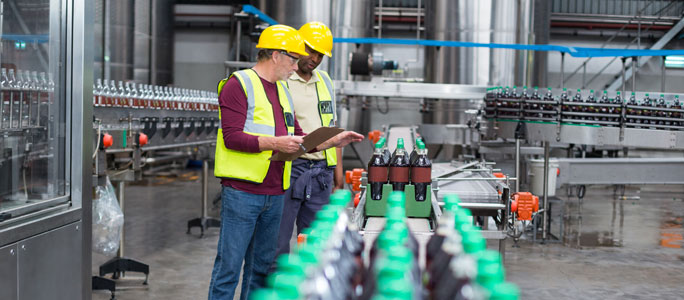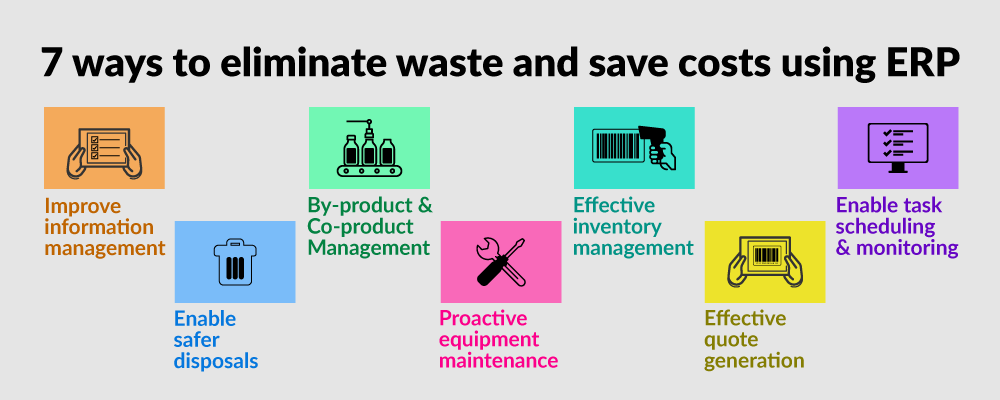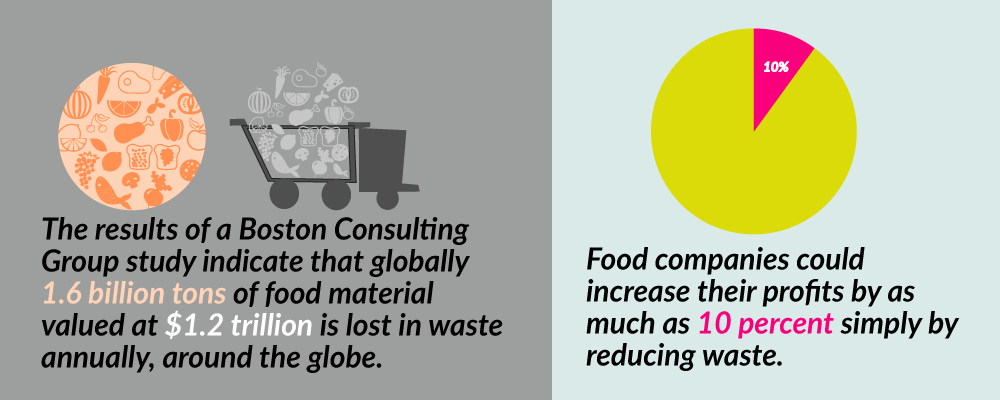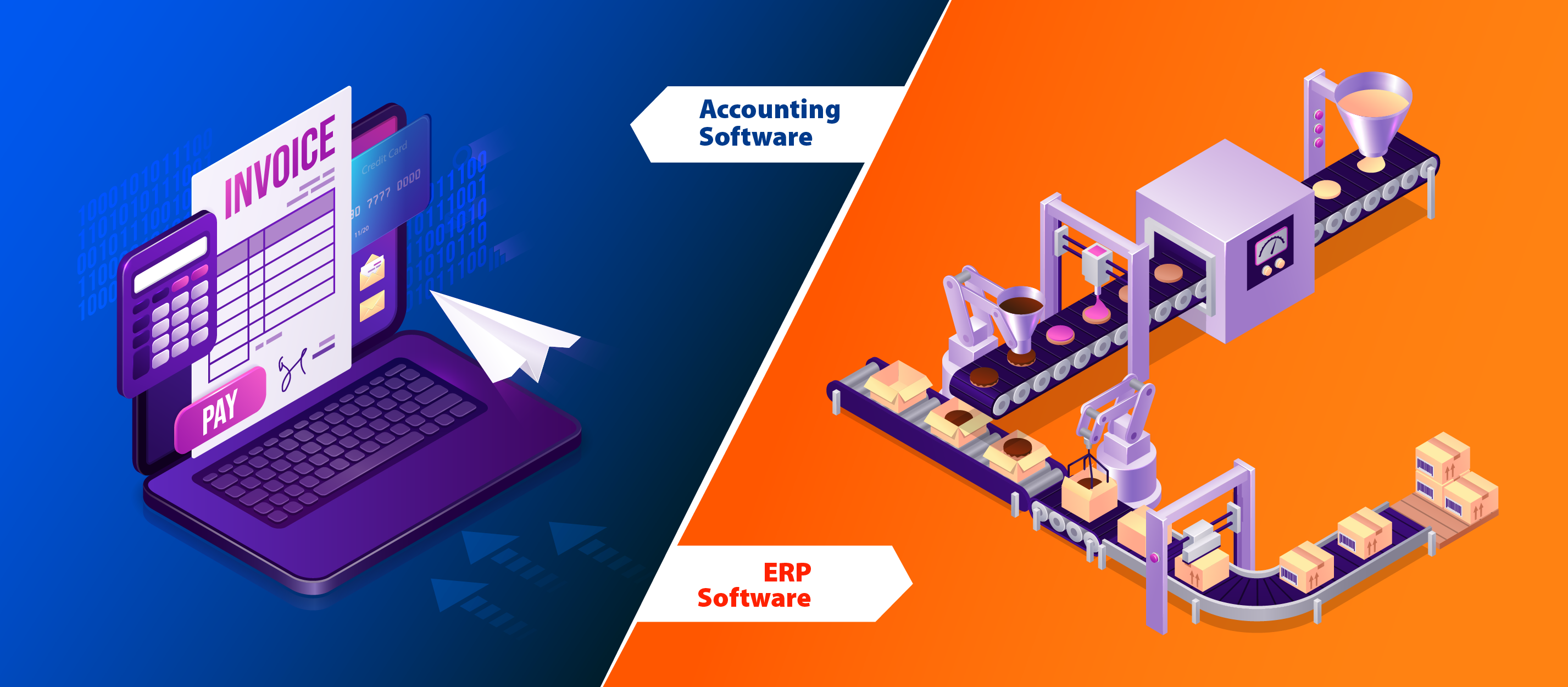
For any manufacturing business, whether discreet or process, the most sought-after objectives are managing resources optimally, and increasing profitability.
To achieve these end goals, manufacturers adopt various practices such as inventory management and control, cost control measures, and waste management.
One thing that drives all these practices efficiently within the four walls of the manufacturing unit is an Enterprise Resource Planning (ERP) Software.
It assimilates the essence of all the principles of lean manufacturing, helping manufacturers eliminate waste and unproductive actions in their production, manage industrial waste, and save costs wherever possible.
Let’s see how an ERP for manufacturing can help manufacturers save costs by waste management.
But to understand it in a better way, let’s first see what manufacturing or industrial waste is, in the context of process manufacturing businesses.
What’s Waste in Manufacturing?
When manufacturing businesses conduct their operations from their plant, different types of useless substances are generated in solid, liquid, or gaseous form, which may either, be hazardous, or non-hazardous in nature.
This is known as waste, in the world of manufacturing.
Some commonly observed wastes include the residue left after the production process, waste from defects, inventory, waiting times, and overproduction, among others.
The products that get spoiled, expired, or are defected, are also a waste, need to be handled & managed properly, or disposed of in a timely manner.
When we talk about waste management, it involves a whole set of activities and actions required to manage waste from its inception to its final disposal.
This includes the collection, transport, treatment and disposal of waste, together with monitoring and regulation of the waste management process.
Impact of Waste on Process Manufacturing Businesses
Waste has a huge impact on the process manufacturing industry, as it affects the food & beverages, pharmaceuticals, chemical, paint, and cosmetics manufacturing businesses, among others, significantly.
Talking about the food manufacturing industry, the scale of waste here is extraordinary.
Impact on the Environment
Another major victim of industrial waste is the environment, as it is a major contributor to environmental pollution (air, land, and water pollution).
Industrial waste being dumped into the water sources and the hazardous gases that are produced as a result of the manufacturing process get mixed with the air and pollute the environment.
To protect and preserve the environment, and to ensure the health and well-being of human beings, it is important to manage waste. But the manufacturers don’t find it easy.
Challenges businesses face in managing waste
Predominantly, there are three major areas of concern for the manufacturers, when it comes to waste management. They are
- Collection,
- Disposal, and
- Reporting
Besides, the manufacturers also need to manage the by-products and co-products, i.e. the secondary products which result incidentally from the manufacturing of the main product.
The issues manufacturers face with the collection, disposal, and reporting, arise mainly due to unregularized and slow processes, poor tracking mechanisms, communication barriers, and lack of resources, among others.
However, well-equipped ERP software can help process manufacturers to address these challenges that impact the process of waste management.
How ERP can Help Manage Waste & Save Costs?
So, in a nutshell, waste results in inefficiency, higher overhead, and reduced profits.
The more the process manufacturers can reduce waste within their organizations, the more they will stay away from fines & penalties and the more efficient—and, thus, profitable—they will be.
An ERP system can help them become more efficient by allowing them effectively manage waste and save costs.
To begin with, it can classify waste into liquid, solid, and gaseous form, help define standard operating procedures (SOPs) and implement them for their proper handling, manage by-products and co-products along with their costing, allow proper disposition of waste, meet regulatory requirements, generate related reports & documents, etc.
Here’s how an ERP can help manage waste:

By improving information management:
Collecting & documenting information related to the different collection and dumping sites, and storing it securely for future use, is an important part of the waste management process.
An ERP software stores huge volumes of data, and even allows modifications to it, thus saving the manual effort & other critical resources.
By enabling safer disposals:
As we spoke above, the safe disposal of industrial waste is a major concern.
An ERP software eases this process, by allowing the manufacturers to ensure full compliance with all the safety standards & regulatory requirements related to waste management & recycling programs, at every level.
By enabling task scheduling & monitoring:
Keeping track of the different waste management activities that happen simultaneously is a tricky job for process manufacturers.
But an ERP software’s easy-to-understand dashboard helps them stay updated about every change in real-time. It also facilitates easy task allocation to individuals and even it’s monitoring.
Effective quote generation:
Manufacturers also rely on third-party vendors to get the waste management work done.
A good ERP software for waste management comes with quote-generating facilities that simplify the proposal process.
It enables you to quickly generate quotes based on the scale of service, resources used, investment, etc.
Classification:
An ERP enables smart classification of waste as Solid, Liquid, gas, and effectively maintains its details, properties, costing plus tracking.
SOPs and instructions can be attached for their proper handling.
By-products & co-products management:
An ERP software can also help create another source of income through managing the by-products & co-products.
While by-products are unavoidable residue of the manufacturing process and are unusable, co-products can be reused and sold.
The tracking and costing of both are critical to process manufacturers and an ERP does so with ease.
All these practices, when efficiently handled and streamlined by the use of an ERP solution, keep auditors, fines and penalties at bay.
They even portray you as an environmental-friendly and responsible organization, ultimately delivering greater value to your organization and customer confidence plus loyalty.
These together make the sum of parts greater than the whole, by bringing in cost savings and profitability.
To sum up
Implementing the right ERP software can immensely benefit your process manufacturing business in terms of long-term waste reduction, cost savings, and profitability.
One such software that has been helping process manufacturers achieve these objectives successfully for the last 30+ years, is BatchMaster ERP.
To know more about it, or to schedule a free demo, get in touch now.



















